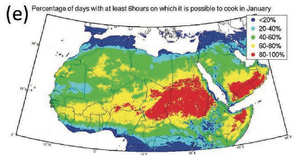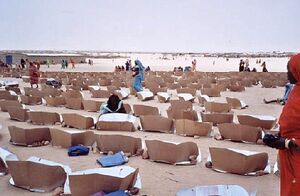Tom Sponheim (talk | contribs) mNo edit summary |
No edit summary Tag: Source edit |
||
| (27 intermediate revisions by 7 users not shown) | |||
| Line 1: | Line 1: | ||
{{GoogleTranslateLinks}} |
{{GoogleTranslateLinks}} |
||
| + | {{ArchivedPage}} |
||
| + | {{Updated|10|31|17}} |
||
| ⚫ | |||
| ⚫ | '''Tchad Solaire''' is working with [[Cord]], the [[KoZon Foundation]], [[Jewish World Watch]], and [[Stichting Vluchteling]] on a large solar cooking project at the [[Iridimi Refugee Camp]] and the [[Touloum Refugee Camp]] in [[Chad]]. The project is located in a near-desert area where [[fuelwood ]]for cooking is extremely scarce, searching at long distances outide the camps is very time consuming and potentially very dangerous. The World Food Programme distributes food, as a function of what it receives from donors, mostly [[maize meal]], dried beans or lentils, a bit of salt and one liter of oil per person per month. |
||
| ⚫ | The solar cooking project is based on a strategy of "[[Integrated Cooking Method|integrated household energy]]". This strategy is based on the use of an [[Rocket Stove|improved woodstove]] for preparing breakfast, the use of the solar cooker (adapted for use in the very windy near-desert areas) for lunch, and the use of the solar cooker with a "[[Haybasket|haybasket]]" to keep food warm for the evening. In this area solar cooking is possible for about 330 days per year, it rarely rains and the main hindrance are the duststorms in December-January. The fuelwood requirement has been reduced to less than 1/4 of what was required earlier. In a [[Evaluations|recent evaluation it]] was found that trips for searching wood have been reduced by 86%. Coordinator Dr. [[Derk Rijks]] reports 14,000 solar cookers have been distributed as of mid-2009. |
||
| + | =={{HeadingNews}}== |
||
| ⚫ | |||
| + | [[File:Solar_Cooking_in_the_Sahel_map,_1-19-15.png|thumb|Solar Cooking in the Sahel - ''NOWCAST''|300px]] |
||
| ⚫ | ''' |
||
| + | *'''January 2015: Scholarly paper documents the available sunshine in the Sahel region of Africa''' - Authors, Beth Newton, Sophie Cowie, Derk Rijks, Jamie Banks, Helen Brindley, and John h. Marsham have published a well-documented analysis of the potential sunshine available for solar cooking in the Sahel region, particularly in northern [[Chad]] where a number of Sudanese [[refugee camps]] are located. Tchad Solaire has been training both refugees and the indigenous population to solar cook in the region since 2005. Even along river population centers where clouds tend to form, solar cooking is possible for over 330 days a year. Read more: [[Media:Solar_Cooking_in_the_Sahel,_NowCast,_1-19-15.pdf|Solar Cooking in the Sahel]] - ''NOWCAST'' |
||
| ⚫ | |||
| ⚫ | The solar cooking project is based on a strategy of "integrated household energy". This strategy is based on the use of an |
||
| − | ==Recent news and developments== |
||
| ⚫ | |||
*'''July 2011:''' A Goedhart Film production, TAHA CHAMCHIHA Solar Cooking in the Sahel, documents daily life for the Sudanese refugees living in camps in bordering [[Chad]]. [[TchadSolaire]] has trained over 12,000 women in the use of simple [[solar panel cooker]]s. These [[CooKits]] have provided the women additional free time normally spent searching for scarce [[firewood]]. Within each camp there is a workshop center where cookers are made for distribution to the other residents. Though the cookers are somewhat fragile, the women have appreciated being involved with the process of making the simple CooKits. The film also shows how the companion ''Guffah'' [[heat-retention cooker]] baskets are being assembled to use with the panel cookers to keep the food piping hot for dinner served in the early evening. |
*'''July 2011:''' A Goedhart Film production, TAHA CHAMCHIHA Solar Cooking in the Sahel, documents daily life for the Sudanese refugees living in camps in bordering [[Chad]]. [[TchadSolaire]] has trained over 12,000 women in the use of simple [[solar panel cooker]]s. These [[CooKits]] have provided the women additional free time normally spent searching for scarce [[firewood]]. Within each camp there is a workshop center where cookers are made for distribution to the other residents. Though the cookers are somewhat fragile, the women have appreciated being involved with the process of making the simple CooKits. The film also shows how the companion ''Guffah'' [[heat-retention cooker]] baskets are being assembled to use with the panel cookers to keep the food piping hot for dinner served in the early evening. |
||
| + | |||
==Articles in the Media== |
==Articles in the Media== |
||
* {{GoogleLinkFromFrench|http://www.afrik.com/article5963.html|Les cuisinières solaires en Afrique|Afrik.com}} |
* {{GoogleLinkFromFrench|http://www.afrik.com/article5963.html|Les cuisinières solaires en Afrique|Afrik.com}} |
||
==Audio and video== |
==Audio and video== |
||
| + | *'''March 2013:''' [[File:TAHA CHAMCHIHA Cuisine Solaire au Sahel|thumb|none|400px|Chadians in refugee camps of Darfur: refugees can cook thereby reducing deforestation and avoiding attacks due to leaving the camp. These simple solar cookers are produced on site by the same refugees who cook with them.]] |
||
| − | *'''July 2011''' |
+ | *'''July 2011:''' [[File:TAHA CHAMCHIHA Solar Cooking in the Sahel-0|thumb|none|400 px|]] |
| + | *'''January 2011:''' [[File:TAHA CHAMCHIHA Solar Cooking in the Sahel.mp4-0|thumb|none|400 px|]] |
||
==See also== |
==See also== |
||
| + | * [[Refugee camps|All refugee camps with solar cooking projects]] |
||
| + | * [[Cord]] |
||
* [[Iridimi Refugee Camp]] |
* [[Iridimi Refugee Camp]] |
||
* [[Touloum Refugee Camp]] |
* [[Touloum Refugee Camp]] |
||
| − | ==External Links== |
||
| − | * http://www.tchadsolaire.com |
||
| − | |||
| − | ==Blogs== |
||
| − | *[http://solarmoxie.blogspot.com/2009/10/chad-solar-cooking-project-evaluation.html Solar Cooking & Water Treatment in Africa] -''[[Karyn Ellis]]'' |
||
| − | |||
| − | ==Contact== |
||
| − | TchadSolaire<br /> |
||
| − | B.P. 5955 Ndjamena<br /> |
||
| − | Iriba<br /> |
||
| − | [[Chad]] |
||
| − | Email: [mailto:tchadsolaire@yahoo.fr tchadsolaire@yahoo.fr]<br /> |
||
| − | Web: http://www.tchadsolaire.com |
||
| − | [[Category:NGOs]] |
||
[[Category:Chad]] |
[[Category:Chad]] |
||
| − | [[Category:Solar Cookers World Network members]] |
||
Latest revision as of 18:19, 27 August 2021
|
Last edited: 31 October 2017
|
Tchad Solaire is working with Cord, the KoZon Foundation, Jewish World Watch, and Stichting Vluchteling on a large solar cooking project at the Iridimi Refugee Camp and the Touloum Refugee Camp in Chad. The project is located in a near-desert area where fuelwood for cooking is extremely scarce, searching at long distances outide the camps is very time consuming and potentially very dangerous. The World Food Programme distributes food, as a function of what it receives from donors, mostly maize meal, dried beans or lentils, a bit of salt and one liter of oil per person per month.
The solar cooking project is based on a strategy of "integrated household energy". This strategy is based on the use of an improved woodstove for preparing breakfast, the use of the solar cooker (adapted for use in the very windy near-desert areas) for lunch, and the use of the solar cooker with a "haybasket" to keep food warm for the evening. In this area solar cooking is possible for about 330 days per year, it rarely rains and the main hindrance are the duststorms in December-January. The fuelwood requirement has been reduced to less than 1/4 of what was required earlier. In a recent evaluation it was found that trips for searching wood have been reduced by 86%. Coordinator Dr. Derk Rijks reports 14,000 solar cookers have been distributed as of mid-2009.
News[]

Solar Cooking in the Sahel - NOWCAST
- January 2015: Scholarly paper documents the available sunshine in the Sahel region of Africa - Authors, Beth Newton, Sophie Cowie, Derk Rijks, Jamie Banks, Helen Brindley, and John h. Marsham have published a well-documented analysis of the potential sunshine available for solar cooking in the Sahel region, particularly in northern Chad where a number of Sudanese refugee camps are located. Tchad Solaire has been training both refugees and the indigenous population to solar cook in the region since 2005. Even along river population centers where clouds tend to form, solar cooking is possible for over 330 days a year. Read more: Solar Cooking in the Sahel - NOWCAST

TAHA CHAMCHIHA Solar Cooking in the Sahel
- July 2011: A Goedhart Film production, TAHA CHAMCHIHA Solar Cooking in the Sahel, documents daily life for the Sudanese refugees living in camps in bordering Chad. TchadSolaire has trained over 12,000 women in the use of simple solar panel cookers. These CooKits have provided the women additional free time normally spent searching for scarce firewood. Within each camp there is a workshop center where cookers are made for distribution to the other residents. Though the cookers are somewhat fragile, the women have appreciated being involved with the process of making the simple CooKits. The film also shows how the companion Guffah heat-retention cooker baskets are being assembled to use with the panel cookers to keep the food piping hot for dinner served in the early evening.
Articles in the Media[]
- Les cuisinières solaires en Afrique - Afrik.com
Audio and video[]
- March 2013:
TAHA CHAMCHIHA Cuisine Solaire au Sahel
Chadians in refugee camps of Darfur: refugees can cook thereby reducing deforestation and avoiding attacks due to leaving the camp. These simple solar cookers are produced on site by the same refugees who cook with them.
- July 2011:
TAHA CHAMCHIHA Solar Cooking in the Sahel-0
- January 2011:
TAHA CHAMCHIHA Solar Cooking in the Sahel.mp4-0




